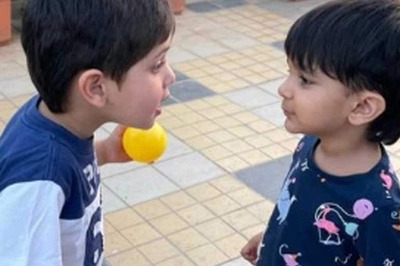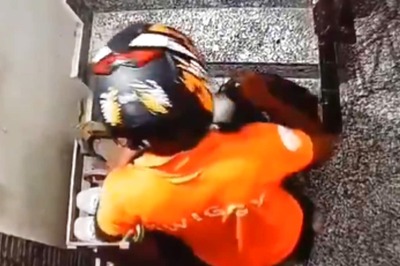
views
Coinciding with Prime Minister Narendra Modi’s visit to the Gulf region, India and the UAE have inked a pact for quickly operationalising the ambitious India-Middle East-Europe Economic Corridor despite the repeated Houthi strikes on vessels in the Red Sea prompted by the Israel-Hamas war.
The issue of IMEC, announced during the G-20 Summit in New Delhi last September, came up for discussion during Modi’s talks with UAE President Sheikh Mohammed bin Zayed Al Nahyan on Tuesday, Foreign Secretary Vinay Kwatra said on Wednesday.
The India-Middle East-Europe Economic Corridor (IMEC), which will connect India, the United Arab Emirates (UAE), Saudi Arabia, Jordan, Israel, and Europe, is seen as a crucial alternative to China’s Belt and Road Initiative (BRI), a multi-country infrastructure project.
The Inter-governmental Framework Agreement concerning Cooperation for the Empowerment and Operation of the India-Middle East-Europe Economic Corridor (IMEC) will further regional connectivity, Kwatra said while briefing reporters on Modi’s visit to the UAE.
“One of the aims is to see how quickly the IMEC gets operated and benefits the core objective of stronger, deeper, more extensive regional connectivity between the parties involved,” he said.
Kwatra said the ongoing disturbance in the region about the conflict in Gaza and the situation in the Red Sea is a matter of concern.
“Both the countries and the leaders continue to monitor, supervise, and exchange notes on them. But it is equally important to ensure that economic cooperation which can be pursued, taken forward continues to stay the course and maintain momentum,” the foreign secretary said.
Kwatra said the main areas under the agreement on IMEC are the ones relating to cooperation on logistics platforms, which is a crucial element of furthering the objectives of this particular quality to the provision of supply chain services.
“Our supply chain services are not just limited to one or two things but cover all types of general cargo, bulk containers and liquid bulk,” he said.
In another development, the Ministry of Investment of the UAE and India’s Ministry of Electronics and Technology (MEITY) have signed an MoU for cooperation on digital infrastructure projects.
“This is a framework agreement that focuses on investment cooperation in the field of digital infrastructures, naturally, as a corollary of that the focus is on developing capabilities and sharing technical knowledge, advice, skills, and expertise under this particular framework.
“Government agencies as also the regulatory authorities will also look to forge partnerships under this particular digital infrastructure MOU,” he added.
Briefing about the Bilateral Investment Treaty between India and the UAE, Kwatra said that the agreement will set the basis for stronger and more extensive and wide-ranging investment partnerships because it focuses not just on protecting the existing investments.
Apart from the pact to quickly operationalise crucial IMEC, India, and UAE signed multiple bilateral agreements during PM Modi’s visit to the Gulf region.
After attending the high-voltage ‘Ahlan Modi’ event that saw massive participation from the Indian diaspora on Tuesday, he is set to inaugurate the largest Hindu stone temple in Abu Dabhi on Wednesday.
Modi attended the World Governments Summit at Dubai and after the temple event, will be headed to Doha to meet the leadership in Qatar as part of his two-day visit to the Gulf region, his seventh since 2015.




















Comments
0 comment